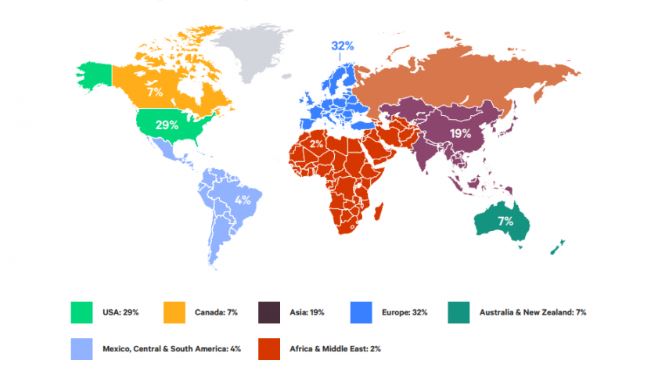Software applications are mostly developed from the client, customer or end user perspective, and if not, from end-user experience. Often, developers work backward to identify customer needs and wants for ascertaining successful innovation.
One of the common challenges when engineers plan a software development life cycle (SDLC) strategy for organizations is to consider dynamic client needs, strict compliance policies, unpredictable market trends, and company goals.
The world is moving at a faster pace in terms of technology evolutions. Organisations across the globe are going through a digital revolution with automation and Artificial Intelligence at the forefront of this paradigm shift.
To remain competitive organisations always looking to strengthen their organizations with a workforce skilled in emerging technologies, and this has increased the demand for professionals who are proficient in new-age tools and systems – one such emerging concept is DevOps.
DevOps is becoming an industry standard for businesses these days. DevOps should be a necessary part of your business plan if you expect to respond quickly to the demands of the market, improve your business’s time-to-market, and keep your software solutions updated regularly and at the same time reducing the cost.
One of the critical new standards when it comes to software development in current scenarios is cloud computing. Companies and organizations across the globe require an scalable, secure and cost-effective solution to manage their data and workflow. As software continues to depend more and more on multiple clouds, it will lead to containerization of software. As a result, traditional functions of development process are going under a dramatic shift. Not just large enterprises, many SMEs (Small and Medium Enterprises) with low budget across the globe are also adopting cloud solutions on account of improved efficiency offered by them, and availability of a good number of players providing tailored solutions for diverse business needs.
- According to “ResearchAndMarkets” The DevOps market was valued at US$3.832 billion in 2019 and is expected to continue showing a solid growth in next 5 years.
- And as per IDC (International Data Corporation), the DevOps software market is projected to grow to $6.6 billion by the year 2022. This will unlocked numerous career opportunities around DevOps.
- As per a Grand View Research report, the global DevOps market size is slated to reach $12.85 billion by 2025.
- Reported in recent research by PayScale/Glassdoor/Salary/Neuvoo, a DevOps Professional’s salary comes under these slabs:
United States:- $175,000 – $201,825
India (Median salary):- INR 6,74,000 – 18,00,000
Australia:- AU$117,117 – $199,098
Germany (Median salary):- €56,457
London (Median salary):- £ 54,069
DevOps is a growing technology with lots of IT processes dependent on it, professionals tend to move to related roles in a few years, growing in expertise and experience.
Geographically, the DevOps market can be classfied as North America, South America, Europe, the Middle East, and Africa (MEA), and Asia Pacific (APAC).

- North America and Europe together have a fairly large market share and market growth and DevOps adoption in these regions is expected to last for at least next 5 years.
- The market growth in Asia Pacific is anticipated to remain solid for next 5 years. Rapid growth of communication and technology industry in countries like China, Japan, India and South Korea among others is one of the major driving factor for the regional market.
- South America, Middle East and Africa account for a relatively small market share. However, market growth in these regions is expected to remain good over the forecast period as governments in these regions continue to focus on strengthening their technology infrastructure which aids in strengthening industrial sectors aligned to it.
Recent outbreak of novel coronavirus has affected businesses worldwide. Since industries continue to witness a slump in growth, reducing costs has become even more necessary for enterprises, while delivering solutions to clients still remains a key focal point.
The future of DevOps is something that can be seen as a cultural shift. Not only are the titles changing, but the roles are changing, as well. Some of the roles have been eliminated, while others have been multiplied.
Almost 42% of companies all over the world want DevOps Engineer, Manager, or consultant in their workforce and 57% of companies want opensource experts with masters DevOps skills, but positions are not easily filled.
The top roles in DevOps include DevOps Architect, DevOps Engineer, DevOps manager, Security Engineer, Automation Engineer, Release manager. The demand for skilled professionals at DevOps is on an all-time rise and it will be like that in future as well.
DevOps is going to be a recession-free profile and you can take advantage of this opportunity to avail top positions at renowned organizations by acquiring the right skills and certifications.
If you have decided to upgrade your career in DevOps role, it would be best to kickstart your DevOps journey DevOpsSchool’s “Master in DevOps Engineering Program” – This is the only course which has been designed and developed by comprehensive research on 10000+ job descriptions across the globe and epitome of 200+ years of industry experience which makes it a complete course which fulfills the requirement of any DevOps roles of the industry.
MotoShare.in delivers cost-effective bike rental solutions, empowering users to save on transportation while enjoying reliable two-wheelers. Ideal for city commutes, sightseeing, or adventure rides.

 Starting: 1st of Every Month
Starting: 1st of Every Month  +91 8409492687
+91 8409492687  Contact@DevOpsSchool.com
Contact@DevOpsSchool.com
